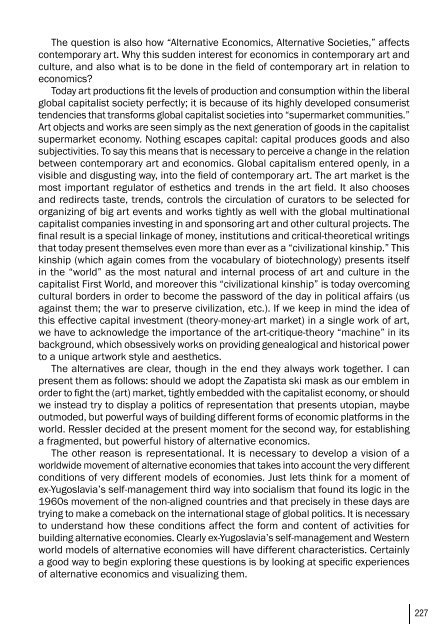art-e-conomy _ reader - marko stamenkovic
art-e-conomy _ reader - marko stamenkovic
art-e-conomy _ reader - marko stamenkovic
You also want an ePaper? Increase the reach of your titles
YUMPU automatically turns print PDFs into web optimized ePapers that Google loves.
The question is also how “Alternative Economics, Alternative Societies,” affects<br />
contemporary <strong>art</strong>. Why this sudden interest for economics in contemporary <strong>art</strong> and<br />
culture, and also what is to be done in the field of contemporary <strong>art</strong> in relation to<br />
economics?<br />
Today <strong>art</strong> productions fit the levels of production and consumption within the liberal<br />
global capitalist society perfectly; it is because of its highly developed consumerist<br />
tendencies that transforms global capitalist societies into “supermarket communities.”<br />
Art objects and works are seen simply as the next generation of goods in the capitalist<br />
supermarket e<strong>conomy</strong>. Nothing escapes capital: capital produces goods and also<br />
subjectivities. To say this means that is necessary to perceive a change in the relation<br />
between contemporary <strong>art</strong> and economics. Global capitalism entered openly, in a<br />
visible and disgusting way, into the field of contemporary <strong>art</strong>. The <strong>art</strong> market is the<br />
most important regulator of esthetics and trends in the <strong>art</strong> field. It also chooses<br />
and redirects taste, trends, controls the circulation of curators to be selected for<br />
organizing of big <strong>art</strong> events and works tightly as well with the global multinational<br />
capitalist companies investing in and sponsoring <strong>art</strong> and other cultural projects. The<br />
final result is a special linkage of money, institutions and critical-theoretical writings<br />
that today present themselves even more than ever as a “civilizational kinship.” This<br />
kinship (which again comes from the vocabulary of biotechnology) presents itself<br />
in the “world” as the most natural and internal process of <strong>art</strong> and culture in the<br />
capitalist First World, and moreover this “civilizational kinship” is today overcoming<br />
cultural borders in order to become the password of the day in political affairs (us<br />
against them; the war to preserve civilization, etc.). If we keep in mind the idea of<br />
this effective capital investment (theory-money-<strong>art</strong> market) in a single work of <strong>art</strong>,<br />
we have to acknowledge the importance of the <strong>art</strong>-critique-theory “machine” in its<br />
background, which obsessively works on providing genealogical and historical power<br />
to a unique <strong>art</strong>work style and aesthetics.<br />
The alternatives are clear, though in the end they always work together. I can<br />
present them as follows: should we adopt the Zapatista ski mask as our emblem in<br />
order to fight the (<strong>art</strong>) market, tightly embedded with the capitalist e<strong>conomy</strong>, or should<br />
we instead try to display a politics of representation that presents utopian, maybe<br />
outmoded, but powerful ways of building different forms of economic platforms in the<br />
world. Ressler decided at the present moment for the second way, for establishing<br />
a fragmented, but powerful history of alternative economics.<br />
The other reason is representational. It is necessary to develop a vision of a<br />
worldwide movement of alternative economies that takes into account the very different<br />
conditions of very different models of economies. Just lets think for a moment of<br />
ex-Yugoslavia’s self-management third way into socialism that found its logic in the<br />
1960s movement of the non-aligned countries and that precisely in these days are<br />
trying to make a comeback on the international stage of global politics. It is necessary<br />
to understand how these conditions affect the form and content of activities for<br />
building alternative economies. Clearly ex-Yugoslavia’s self-management and Western<br />
world models of alternative economies will have different characteristics. Certainly<br />
a good way to begin exploring these questions is by looking at specific experiences<br />
of alternative economics and visualizing them.<br />
227


